The Commission has heard repeatedly from New Yorkers concerned about Internet access for the poor and disadvantaged. Comcast and its supporters have frequently pointed to Internet Essentials as an example of the kind of altruism Comcast is allegedly known for in its vast service areas.
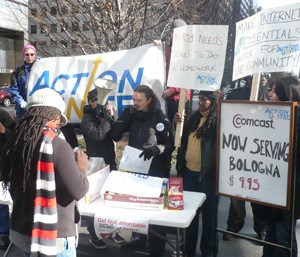
COMCAST: NOW SERVING BOLOGNA – $9.95 — Protesters outside of Comcast’s Philadelphia headquarters upset about Internet Essentials onerous terms and pre-qualification conditions. (image: Kevin McCorry/WHYY)
Unfortunately, the truth is very different. Internet Essentials is both a political tool for Comcast’s image-building effort and a discount program that carefully avoids cannibalizing the revenue the company already receives from hard-working, income-challenged broadband subscribers – many who might otherwise have qualified for the program had they know about it and made it through the onerous application process without being disqualified.
The Washington Post reported a remarkable admission from Comcast senior vice president David Cohen, who admitted he stalled the introduction of the program to use it as an incentive to win approval of its merger with NBCUniversal:[1]
In fall 2009, Comcast planned to launch an Internet service for the poor that was sure to impress federal regulators. But David Cohen, the company’s chief of lobbying, told the staff to wait.
At the time, Comcast was planning a controversial $30 billion bid to take over NBC Universal, and Cohen needed a bargaining chip for government negotiations.
“I held back because I knew it may be the type of voluntary commitment that would be attractive to the chairman” of the Federal Communications Commission, Cohen said in a recent interview.
John Randall, program manager at the Roosevelt Institute/Telecommunications Equity Project, after studying the terms and conditions and pre-qualifications necessary to sign up for Internet Essentials declared it was more a public (and government) relations exercise than a charitable endeavor.[2] Comcast’s terms protect its revenue base by disqualifying current customers (who presumably pay the regular price for Internet service), establishing a lengthy 90 day waiting period without cable or Internet service before current customers can sign up for the discount program, not allowing participation unless you have school age children qualifying for the National School Lunch Program, and not have an overdue bill or unreturned equipment.[3]
Perhaps that explains why, in 2013, only 150,000 out of 2.6 million households eligible for Internet Essentials were able to sign up. In Comcast’s home city of Philadelphia, only 3,250 families were signed up as of last summer.[4]
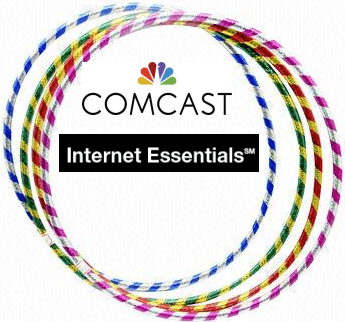
Jump through hoops for $9.95 Internet
Comcast continues its revenue protection efforts to this day, even after announcing a recent “Amnesty” program for customers rejected from getting Internet Essentials because of a past due balance.
Just in time for regulators taking a hard look at Internet Essentials, Comcast has announced a 1.5 month special offer that includes “up to” six months of complimentary Internet Essentials service, but only to those who have never applied for the program before. Rejected applicants and current participants don’t qualify. Comcast does not specify whether customers will get an entire six months or a shorter term that seems to be indicated by the language Comcast uses.[5]
Comcast’s new “Amnesty Program,” for Internet Essentials is also replete with pre-conditions and fine print.[6]
Customers with a past due balance more than one year old will, “as long as they meet all the other eligibility criteria, provide amnesty for that back due bill for the purpose of connecting to Internet Essentials.”
It is unclear whether “amnesty” means Comcast will cancel collection efforts on the back balance or simply ignore it as grounds to reject an Internet Essentials application. Customers with a past due balance less than one year old don’t get much “amnesty” at all. Comcast wants them to pay up before they can sign up for Internet Essentials, but might accept an installment plan in certain circumstances.
Time Warner Cable, by accident, has managed to create a superior alternative to Internet Essentials that is open to everyone without pre-conditions or limits, although it costs $5 a month more than Comcast’s program.
Time Warner’s Everyday Low Price Internet ($14.99/month) was originally designed as a marketing campaign targeting price-sensitive DSL customers. But Time Warner Cable also recognized the 2/1Mbps Internet service would appeal to the income-challenged.[7]
Time Warner’s program is vastly superior to Comcast’s Internet Essentials because every customer automatically qualifies for the service if they choose to enroll. There are no forms to fill out, income qualifications, account audits, waiting periods, or limits on how long you can keep the discounted service. Time Warner Cable seems unconcerned about whether this discounted Internet will cannibalize revenue from higher-priced plans and has launched aggressive marketing campaigns across its service areas.[8]
—
[1]https://www.washingtonpost.com/business/technology/david-cohen-chief-dealmaker-in-washington-is-comcasts-secret-weapon/2012/10/29/151e055e-080a-11e2-858a-5311df86ab04_story.html
[2]http://stopthecap.com/2013/07/10/comcasts-internet-essentials-facade-padding-the-bottom-line-without-cannibalizing-your-base/
[3]https://www.salon.com/2013/07/10/comcasts_new_partner/
[4]http://stopthecap.com/2013/07/10/comcasts-internet-essentials-facade-padding-the-bottom-line-without-cannibalizing-your-base/
[5]https://corporate.comcast.com/comcast-voices/comcast-to-offer-six-months-of-free-internet-essentials-service-and-announces-debt-forgiveness-plan
[6]https://corporate.comcast.com/comcast-voices/comcast-to-offer-six-months-of-free-internet-essentials-service-and-announces-debt-forgiveness-plan
[7]https://newsroom.charter.com/
[8]https://newsroom.charter.com/


 Subscribe
Subscribe

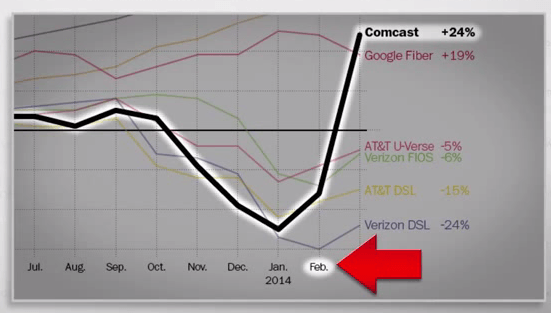

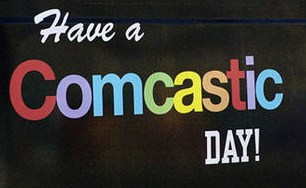 Stop the Cap! has talked with more than a dozen customers in Comcast’s test markets about their experiences with Comcast’s “data usage policy.” Although the company claims it is seeking customer reactions, it never asks whether those customers want usage limits or not, only what kind.
Stop the Cap! has talked with more than a dozen customers in Comcast’s test markets about their experiences with Comcast’s “data usage policy.” Although the company claims it is seeking customer reactions, it never asks whether those customers want usage limits or not, only what kind.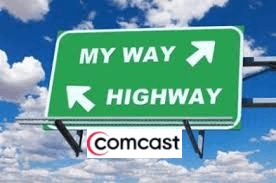 Comcast will introduce usage-based billing on all of its broadband customers nationwide within five years, whether they like it or not.
Comcast will introduce usage-based billing on all of its broadband customers nationwide within five years, whether they like it or not.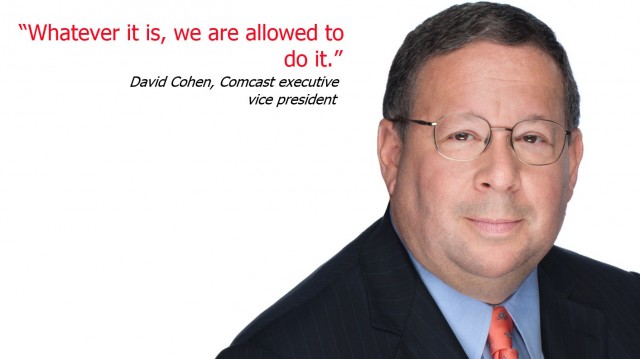 If the merger is approved, Comcast will face significantly less competition in many Verizon service areas also served by Time Warner Cable. Verizon FiOS expansion has ended and the company continues to de-emphasize its DSL service, which is the only broadband competition Time Warner Cable faces in many upstate New York and western Massachusetts communities.
If the merger is approved, Comcast will face significantly less competition in many Verizon service areas also served by Time Warner Cable. Verizon FiOS expansion has ended and the company continues to de-emphasize its DSL service, which is the only broadband competition Time Warner Cable faces in many upstate New York and western Massachusetts communities.
